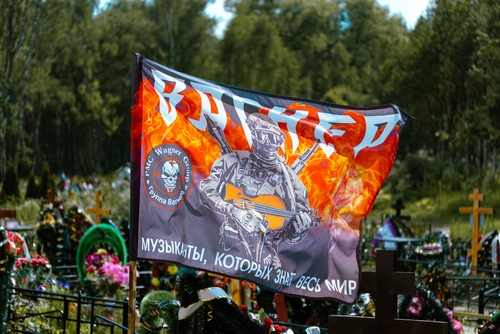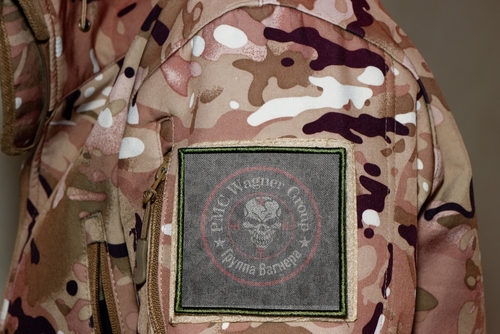In the complex landscape of global business and geopolitics, the ability to effectively manage international risks is paramount. As discussed on this week’s episode of The International Risk Podcast, one emerging challenge that demands our attention is the growing risk posed by the activities of mercenary groups around the world. As accounts of harrowing human rights abuses by the Wagner group continue to emerge, both in Ukraine and beyond, it becomes clear that such organizations pose significant threats to international stability.
Put simply, mercenary groups are orgaisations that operate on the fringes of legality. Whilst infamous for the military services they provide in complex conflict zones, their activities span a wide spectrum and include engagement in cyberattacks and corporate espionage. It is for this reason that understanding the risks they bring is crucial for businesses and governments alike.

The Intricate Web of Geopolitics, Mercenaries and International Risk
Invariably, the primary concern surrounding mercenary groups centers on their involvement in nuanced geopolitical conflicts. The world need only look at the presence of Russian Wagner Group mercenaries in Ukraine and Syria, where involvement has further complicated the tense relationships between Russia and the West, to understand the gravity of the risks mercenary groups pose to world order. Of most concern is the fact that mercenary groups like Wagner operate under a veil of plausible deniability, making it nearly impossible for nations to address their actions directly.
Whilst the presence of mercenaries in Ukraine has captivated public attention since Russia’s illegal invasion last year, they have in fact played a significant role in fuelling the conflict since 2014 when territorial disputes began. Not only has their presence prolonged the suffering of civilians but it has also added many layers of complexity to the international risk assessment with the potential for an escalation that could draw in neighboring countries demonstrating the importance of diplomatic efforts in mitigating this international risk.
International Risk Within Mercenaries as Corporate Threats
The risks posed by mercenary groups extend beyond their role in global conflict, however. Indeed, the threat they pose to businesses worldwide, whilst not often discussed, is significant. Major multinational corporations operating in politically unstable regions could be particularly vulnerable – mercenary groups may target such corporations to extract valuable information or disrupt their operations. Moreover, previous events have demonstrated how mercenaries may seek to breach cybersecurity in order to expose sensitive data, resulting in substantial financial and reputational damage.
The 2014 cyberattack on Sony Pictures demonstrates the impact of such attacks. Causing significant financial losses and resulting in the leakage of sensitive information, this attack was eventually linked to North Korean mercenaries. Incidents like this highlight the need for enhanced cybersecurity measures in an increasingly interconnected world in which mercenary groups are on the rise.

The Looming Shadow of Borderless Terrorism
Given their shadowy nature, it is perhaps not surprising that mercenary groups often share interests and affiliations with terrorist organizations, thus complicating the international risk landscape. The presence of private military contractors in conflict zones like Syria has blurred the lines between mercenaries and extremist groups. The involvement of mercenary groups in the Syrian civil war has had significant consequences. Mercenaries, hailing from many different countries, have joined both government and rebel forces, contributing the the conflict and raising the risk that they will return home with extremist ideologies.
The Global Talent Equation: Mercenary Recruitment
Despite media headlines focusing on the recruitment of Russian prisoners into the Wagner Group, mercenary groups attract a wide range of individuals, including individuals with military training and expertise who are lured by financial incentives. This phenomenon brings its own array of international risks. As skilled professionals move away from legitimate roles into the service of shadowy organizations, regions and industries may be destabilized. In recent years, there has been much attention paid to claims that Western ex-military personnel have joined mercenary groups in conflicts, including the Yemeni Civil War. This development raises further possibilities including the risk of individuals committing violence abroad where accountability is difficult, as well as the risk that their professional background will render mercenary groups increasingly formidable opponents.
Holding Mercenary Groups Accountable: the options?
1. Legal Frameworks: One mechanism for holding mercenary groups accountable is through international legal frameworks. Organizations such as the United Nations have called for stricter regulations and oversight of private military and security companies. While these efforts aim to clarify the legal status of mercenaries and their actions, enforcing such regulations can be challenging, especially in conflict zones with weak governance.
2. Diplomatic Channels: Diplomatic negotiations and international pressure can also play a role in holding mercenary groups accountable. Nations affected by the activities of these groups may seek redress through diplomatic channels, calling on the international community to condemn and take action against them. However, the very nature of diplomacy renders it a slow and often frustrating process.
3. Global Intelligence and Cooperation: Enhanced global intelligence sharing and cooperation among nations are essential for tracking and disrupting the activities of mercenary groups. Intelligence agencies can play a vital role in identifying the leaders and financiers behind these organizations, which can lead to international sanctions and legal actions against them.
4. Corporate Responsibility: In cases where mercenary groups target businesses, corporate responsibility and engagement can be a means of holding them accountable. Businesses can work with governments and international organizations to investigate and prosecute those responsible for attacks or breaches.
5. Civil Society and Public Awareness: Civil society organizations and public awareness campaigns can bring attention to the activities of mercenary groups. Public pressure can compel governments and international bodies to take action against these organizations, and transparency can be a powerful tool in holding them accountable.
Nevertheless, whilst such mechanisms exist, the clandestine and transnational nature of mercenary groups inevitably renders them a difficult target of accountability. The secretive and dispersed nature of their operations results in difficulty gathering evidence and enforcing international laws, whilst the involvement of state actors could provoke animosity and in some cases further complicate the situation.

Moving Forward: Navigating the Mercenary Minefield
It is undeniable that in an era marked by unprecedented global transformation and evolving international risks, the presence and activities of mercenary groups demand our utmost vigilance. Businesses, governments, and international organizations must collaborate to develop strategies that mitigate the risks posed by these shadowy entities and hold them accountable for their actions. However, by understanding these risks and employing a multifaceted approach, governments, businesses, and international organizations can go far in navigating the mercenary minefield, ensuring that mercenary groups are met with some level of accountability. As the turmoil of Wagner unfolds across Africa, we are reminded why doing so is imperative for creating a safer and more secure global landscape.